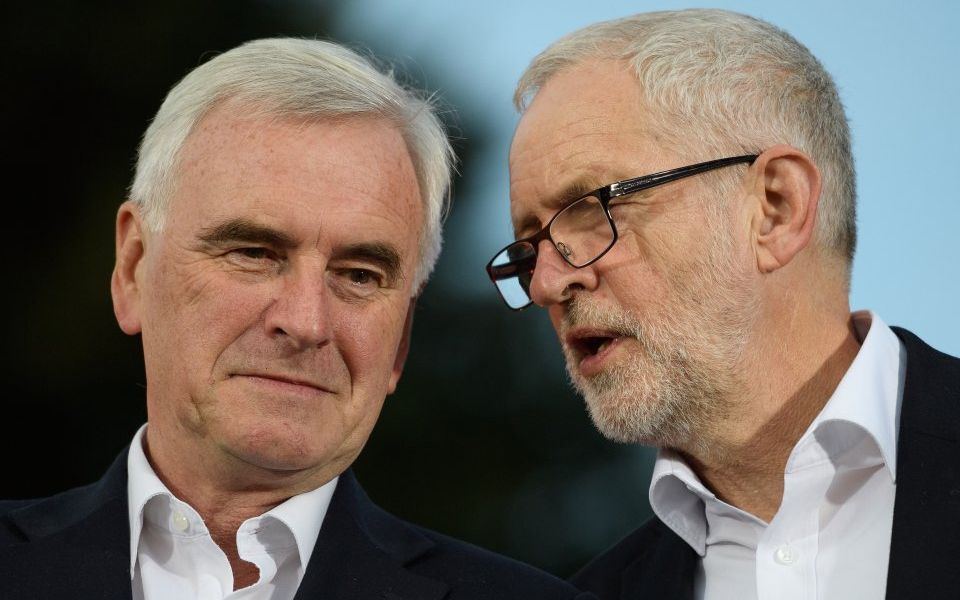It’s all fun and games, until Labour crashes the economy

Labour is “war-gaming” crashing the economy.
That’s not the exaggerated spin of the hysterical mainstream media – it’s the words of shadow chancellor John McDonnell himself.
McDonnell told Momentum activists at a Labour conference fringe event on Monday night that “people want to know we’re ready” for the chaos that could hit if the party were ever elected – such as capital flight and a run on the pound. And the person to get them ready, apparently, is the self-proclaimed “cybernetic communist” Richard Barbrook.
Read more: Labour's scenario planning for a run on the pound if it gets elected
Barbrook is the left-wing academic who wrote Corbyn’s digital manifesto, without any reference to protecting people from online abuse, even as Labour MPs were receiving death and rape threats for perceived disloyalty to their leader. He has his own personal brand of nastiness when it comes to moderate Labour MPs, having urged them to “shut the f*ck up” and pushed for their deselection.
On any other day, this discrepancy with Corbyn’s “kinder, gentler politics” would be the main story.
But in this case, the revelation of what Barbrook is actually doing is even more disturbing. His “Class Wargames” website promises to create a space that “investigates gaming as a metaphor for social relations under repressive neoliberalism” and “trains the militants of the cybernetic communist revolution to come”.
This, according to the shadow chancellor, is how the official opposition party is preparing for government.
There are a couple of fascinating – if disturbing – things to note about the war game plan.
The first is, obviously, the cultishness of Barbrook’s project. The website, which explains how gamers can be promoted into “activists”, looks suspiciously like a medium for indoctrinating young people through gaming, using phrases like “the production of works of ludic subversion in the bureaucratic society of controlled consumption”. There are even disciplinary procedures for “activists” who fail to meet expectations.
Clearly, this is not a game, but nor does there seem to be any of the scientific rigour that one hopes would form the basis for an economic platform.
But the second, broader, point would stand even if Barbrook was leading a team of economists and data scientists – namely, these people know they are going to crash the economy.
And they want to be ready.
Labour’s inner circle is acting as though the prospect of Prime Minister Corbyn is only a matter of time. The rest of McDonnell’s fringe speech included promises to “hit the ground running” with a range of radical economic policies – tax rises, new regulation, renationalisation, government seizure of private property.
The controversial promise during his official speech earlier that day to bring PFI contracts back under state control is only the beginning.
The fact that the Corbyn team is turning to Barbrook to game out the backlash their economic regime would cause shows they are well aware of both how unpopular and how damaging these policies would be.
And they are expecting resistance – McDonnell used words like “assault”, while the Corbynite economist Paul Mason talked about being “in crisis mode”.
This is not the language of a new government confident in its democratic mandate.
In fact, Mason’s military imagery went further, and more specific. He compared the first few months of a new Corbyn government to the Battle of Stalingrad – a victory for the Soviets, yes, but an immensely bloody one won under the leadership of a despot who slaughtered millions of his own people.
Is that really an analogy the Corbynites are comfortable with?
McDonnell has long been a proponent of revolutions, and has in the past endorsed groups who favour violent and illegal action over the slow pace of democratic change. But nonetheless, it is shocking to hear one of the leading members of the opposition in full-on combat mode, proudly explaining how the party plans to button down the hatches to ward off the country’s fury when it deliberately tanks the economy.
At the start of the conference, we saw Labour party delegates and trade unionists celebrating the fact that 40,000 drivers could soon be out of work thanks to TfL’s ban on Uber. Now we have the shadow chancellor assuring us that the party has contingency plans for the chaos it intends to cause.
Labour does have sensible, hard-working MPs with smart ideas for improving Britain – Angela Rayner made a strong impression yesterday, while Sir Keir Starmer is widely well-respected.
But when party heavyweights are using a cybernetic communist to map out how to force through change the electorate will inevitably resist, that’s not a government in waiting – it’s an aspirational coup d’etat.
Read more: DEBATE: Has Labour got its act together after a year of turbulence?